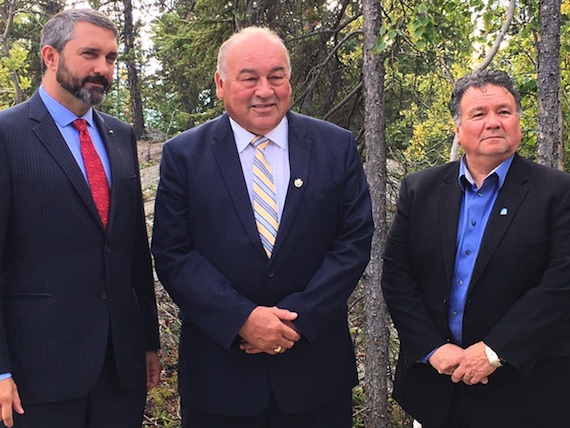Premiers from Canada’s northern territories present Ottawa with a united front
A united front, like the kind that musk oxen form for protection: That’s the image presented Aug. 31 by the three northern premiers when they wrapped up their annual Northern Premiers Forum in Yellowknife.
Peter Taptuna of Nunavut, Bob McLeod of the Northwest Territories and Sandy Silver of Yukon came out with a strong message for the federal government, on behalf of all territorial residents, Indigenous and non-Indigenous, saying they want more involvement in decisions that affect them and more financial support for infrastructure.

To industry, the premiers delivered a message that they want to make investment in the territories more attractive rather than increase “regulatory complexity or uncertainty.”
The premiers, aiming for “responsible, sustainable development and economic diversification,” said their overall goal is to boost educational levels and bring in more business development and jobs — “many of which are tied to infrastructure development,” they said in a joint news release.
Speaking at the end of a news conference, held Aug. 31 at the Northwest Territories legislature in Yellowknife, Taptuna said, in response to a question from Nunatsiaq News, that there’s a “systematic problem of lack of infrastructure” in Nunavut.
Taptuna said the Government of Nunavut appreciated the recent announcement of more federal money for the northern territories’ infrastructure — $400 million spread over 11 years, split between the three territories.
But Taptuna and the other two premiers said they want funding agreements for much-needed major projects to address the North’s infrastructure deficit and provide flexibility in their current capital budgets.
That’s because their capital budgets are limited: Nunavut’s federally-imposed $650-million debt cap means the territory can’t borrow to underwrite large infrastructure projects.
Taptuna and the two other northern premiers didn’t mention their big infrastructure wish-lists for projects such as Grays Bay in western Nunavut or the Government of the NWT’s plan for its Slave Geological Province Access Corridor road north from Yellowknife.
But they did make a link between infrastructure and climate change, arguing that, “key infrastructure investments will help to address our immediate and ongoing need to adapt to changes in our environment and landscape that are affecting both the health and prosperity of northerners.”
As for the upcoming dissolution of Indigenous and Northern Affairs Canada and the creation of two new departments, which Prime Minister Justin Trudeau announced Aug. 28 in Ottawa as the northern premiers prepared to meet in Yellowknife, they said this could provide an opportunity to improve not only the federal government’s relationship with Indigenous peoples, but also with northern governments.
That reorganization could see decision-making affecting the North moved out of the new department of Crown-Indigenous Relations and Northern Affairs and into the hands of northern governments — and the ultimate dissolution of the Northern Affairs program, they said.
And it could also create an opportunity to honor the intent of devolution agreements, they said.
Taptuna said Nunavut needs a devolution agreement to make decisions and to become more self-sustaining.
Unlike Yukon and the NWT, Nunavut still does not have an agreement with the federal government devolving responsibility for public lands and resources.
The premiers said northerners must be at the forefront of decisions affecting the economic future of the North and that the territorial governments need to be engaged in any federal planning processes that could affect the delivery of programs and services to northern residents.
They also called for more consultation with the federal government on the Arctic Policy Framework.
“Premiers will not be a part of any policy framework that does not enhance the economic future for the territories,” they said, promising to produce their own Pan-Territorial Vision for Sustainable Development by the end of this month.
The premiers also said they’re concerned about the federal plan to introduce a surcharge on diesel fuels as a move to reduce dependency on polluting and climate-warming fossil fuels.
They said a carbon tax must be designed so it doesn’t, “negatively impact northern costs of living, undermine food security or threaten emerging economies.”
Carbon pricing, as it is currently planned, would place a surcharge of $10 per tonne on carbon-based fuels, mostly diesel, sold in Canada, starting in 2018.
They said that when carbon pricing is enforced, it will come at great cost to the Nunavut government which already relies on federal transfers for the majority of its budget, and because the GN is a large consumer of fuel for buildings such as government housing, schools and health centres.
The premiers also criticized proposed amendments to the Oceans Act and the Canada Petroleum Resources Act included in Bill C55, now under consideration by MPs.
These allow for the creation of Interim Marine Protected Areas by a federal minister without prior consultation.
“This amendment should not be part of Bill C55,” they said.
Nunavut plans to host the 2018 Northern Premiers’ Forum.